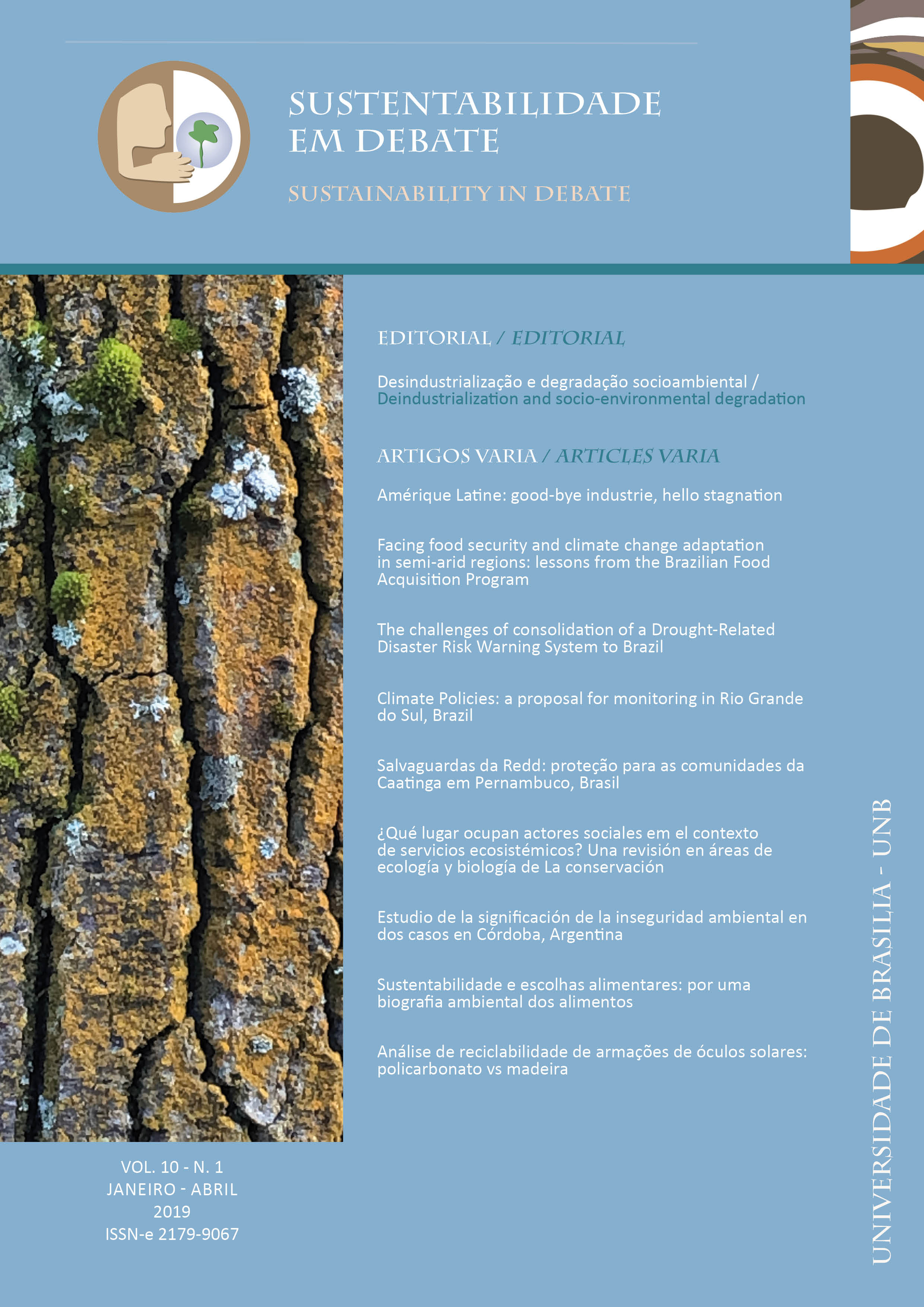Subnational Climate Policies: a proposal for monitoring in Rio Grande do Sul, Brazil
DOI:
https://doi.org/10.18472/SustDeb.v10n1.2019.19942Palabras clave:
Monitoring of climate policy. Subnational governance. Rio Grande do Sul.Resumen
Monitoring and evaluation of climate policies promote transparency and enable public engagement. Covering the period 2011 to 2017, this essay presents a qualitative analysis of the Policy on Adaptation to Climate Change adopted by the state of Rio Grande do Sul, as contribution to the debate about subnational adaptation policies. We use the set of tools developed by the Open Climate Network, which differs from the measurement of greenhouse gas emissions by the territory to assess the progress made in the implementation of the adaptation policies through public governance. While adoption by the state government started 2010, we conclude that this subnational adaptation policy still is in the stage of validation against the emission reduction targets proposed by the Paris Agreement, until 2025. Several adaptation policies are under way in Rio Grande do Sul, however, in a (still) fragmented mode. We identified gaps in the state budget, as well as governance constrains for the next step of implementation.
Descargas
Descargas
Publicado
Cómo citar
Número
Sección
Licencia
Derechos de autor 2019 Sustentabilidade em Debate

Esta obra está bajo una licencia internacional Creative Commons Atribución-NoComercial-SinDerivadas 4.0.
La presentación de la(s) obra(s) científica(s) original(es) por parte de los autores, como titulares de los derechos de autor de los textos enviados a la revista, de conformidad con la Ley 9.610/98, implica la cesión de derechos de autor de publicaciones impresas y/o digitales a la Revista de Sustenibilidad en Debate de los artículos aprobados para fines de publicación, en un único número de la Revista, autorizando también que la(s) obra(s) científica(s) aprobada(s) se divulguen de forma gratuita, sin ningún tipo de reembolso de derechos de autor, a través del sitio web de a Revista, para leer, imprimir y/o descargar el archivo de texto, a partir de la fecha de aceptación para publicación. Por lo tanto, los autores, al presentar los artículos a la Revista y, en consecuencia, la libre cesión de derechos de autor relacionados con el trabajo científico presentado, son plenamente conscientes de que no serán remunerados por la publicación de los artículos en la revista.Â
La Revista está licenciada bajo una licencia no comercial y sin derivaciones Creative Commons (No permite la realización de obras derivadas) 3.0 Brasil, con el propósito de difundir conocimientos científicos, como se indica en el sitio web de la publicación, que permite el intercambio del texto y el reconocimiento de su autoría y publicación original en esta revista.
Los autores pueden asumir contratos adicionales por separado, para la distribución no exclusiva de las obras publicadas en la revista Sustenibilidad en Debate (por ejemplo, en un capítulo de libro), siempre que se indique que los textos se publicaron originalmente en esta revista y que se menciona el DOI correspondiente. Se permite y incentiva a los autores a publicar y distribuir su texto online después de su publicación (por ejemplo, en repositorios institucionales o en sus páginas personales).Â
Los autores aceptan expresamente los términos de esta Declaración de Derechos de Autor, que se aplicará a la presentación si es publicada por esta Revista.





